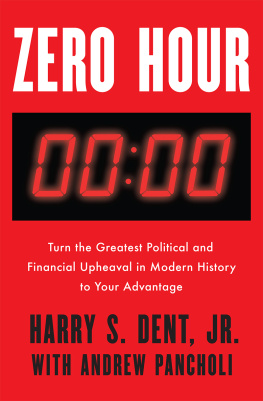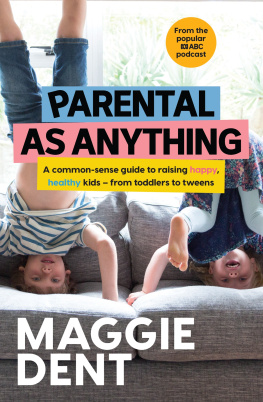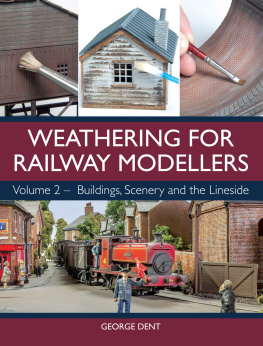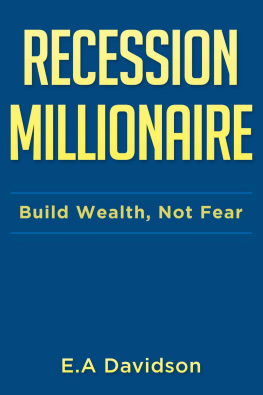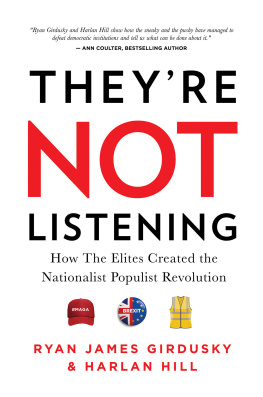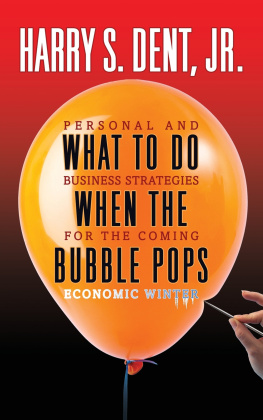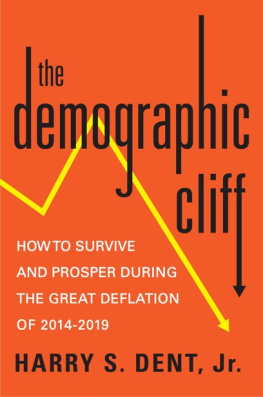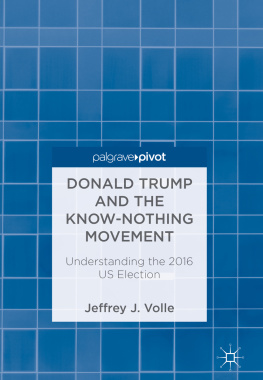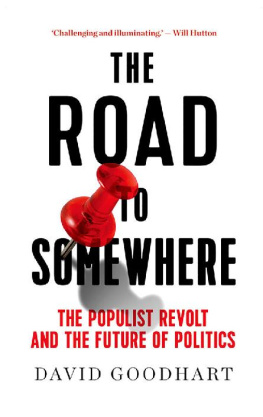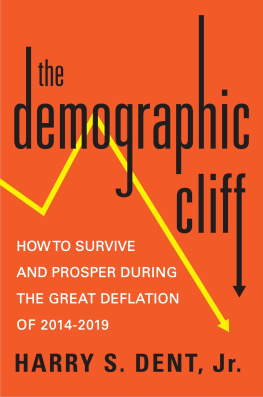
Published by Schwartz Publishing Pty Ltd
Level 1, 221 Drummond Street
Carlton VIC 3053, Australia
www.blackincbooks.com
Original edition published by Portfolio,
an imprint of Penguin Random House LLC
375 Hudson Street
New York, New York 10014
Copyright Harry S. Dent, Jr. with Andrew Pancholi 2017
This edition published in 2018
Harry S. Dent, Jr. and Andrew Pancholi reserve their right to be known
as the authors of this work.
ALL RIGHTS RESERVED.
No part of this publication may be reproduced, stored in a retrieval system, or transmitted in any form by any means electronic, mechanical, photocopying, recording or otherwise without the prior consent of the publishers.
9781760640477 (paperback)
9781743820247(ebook)

Jacket design: Henry James Nuhn
Jacket image: Artur Synenko / Shutterstock
Harry. S. Dent, Jr. photograph Brendan J. Finnerty
Andrew Pancholi photograph Christopher Bissell
To my wife, Jean-ne, the love of my life, and the person that has stood by me the most, through all my trials and tribulations.
To my deceased father, Harry S. Dent, Sr., who was a brave and visionary political strategist that thrust the South into the political mainstream by electing Nixon through the swing vote in 1968. He became known for his southern strategy. Hes the best politician I know and I learned much from him. He was the greatest role model a son could have.
Harry Dent
To my father, Vijay, who is no longer with us, and my mother, Nilaboth of whom always encouraged the gathering of knowledge.
To Karen, Chanteyhl, and Jake for their never-ending support.
Andrew Pancholi
PREFACE
I GET BASHED A LOT in Australia for warning about your cherished real estate bubble (but in the end Ill be right about it). However, I have always touted Australia and New Zealand as the countries that would be the most attractive in the worst of the scenarios I outline in Zero Hour: a major financial crash and global upheaval. During an era when most developed countries predict slowing to flat demographic growth for decades ahead, Australia and New Zealand are two of only six countries that have millennial generations that are substantially larger than the baby boomer generations. These populations will take them to new heights in the decades ahead. Only Israel has stronger trends. But whereas it is positioned in the middle of the worst geopolitical zone in the world, Australia and New Zealand are on the edge of Asiawith the best growth potential.
As Figure 18.1 shows, Australias uber-strong demographic growth in spending will cushion it in the inevitable global downturn aheadwhat I call the Winter Season. All things considered, I rank Australia as the best developed country in the world for future growth as well. If the U.S. is the best large country in a bad neighborhood, Australia is the best small developed country. When I speak in Australia and New Zealand, I dont see the extreme political polarization that I see in the U.S. and even in Europe. You are also very civil and law-abiding countriesthe first time I was here I got major stares just for jaywalking.
In Zero Hour, I predict the greatest political and social revolutions since democracy itself in the late 1700s and a massive retreat in globalization, as occurred between 1913 and 1945. You should escape the worst of that, whilst also reaping the innovations that come out of it. Australia and New Zealand have two great challenges ahead. The first of these is that you are two of the most extreme real estate bubbles in the developed world, second only to Hong Kong. New Zealand is higher than Australiadue to the substantial fall in prices in Australias mining areas, such as Perth and Darwin. But as this figure shows, real estate bubbles in major cities around the world (based on median home price to median income) hit the everyday person (valuations are much higher for the more wealthy and higher end real estate).
As Figure 12.2 shows, Sydney ranks as the fourth most dangerous real estate bubble behind Hong Kong, Beijing, and Shanghai. It is higher than Vancouver, Canadas most bubbly city. Auckland ranks sixth and Melbourne ranks seventh. Sydney has a riskier real estate bubble than Honolulu, San Francisco, and Los Angelesthe bubbliest cities in North America.
Sorry, that is not a good sign. Its not good for living affordability, especially for the younger generation coming along. Its not good for the cost of business Period! Its only good for older people who have been sitting in houses and, lets be honest, they are going to die in the next few decades.
On my last tour to Australia, I finally started to hear more economists warning about your housing bubble. Nice not to be alone on that one anymore. Look at my bubble model chart for Sydney in Figure 12.5. It has seen a 3.1 times gain just since 2000 and is projected to fall as much as 58 percentnot as bad as many other bubble cities globally. Shanghai has bubbled up 8.7 times since 2000 with a projected crash of 78 percent.
Despite Australias stellar demographic trends, its housing trends are not as bullish. Why? Because older people not only dont buy houses but when they die, they sell. Given the baby boomer trends were stronger than the millennial growth rates even in Australia, the dying of the baby boomers between 2015 and 2045 will cause net home demand to decline.
Australias peak net demand came in 2015 with a first decline into 2020. The second peak comes in 2025, at the same height as in 2015, and declines much more markedly into 2045. On this model, I am projecting more like a 50 percent decline in Australia.
You should see Germany or Japan or even the U.S. on this metric. As the baby boomer generation fades into the sunset, real estate will never be the same. But again, unlike most other developed countries, even at their worst your trends in net demand dont turn negative. Do you know that Japan already has eight million empty homes? And its going to get a lot worse. The U.S. will have net negative demand from 2028 through 2039 after steady declines until then. And if China is the worst real estate bubble in the world and they are your biggest and most aggressive foreign buyers, how does that bode for your real estate markets when Chinas wealth evaporates (as it did for the Japanese in the 1990s) and they stop buying in Australia and New Zealand?
Your commodity exports, especially to China, have already been hit, and real estate prices in Perth are already down as much as 50 percentyes, real estate can go down in Australia. Those exports will also take a further hit ahead. But your exports as a percentage of GDP are 20 percent, lower than the average country at 30 percent, and much lower than Germany, China, and many other countries.
The second challenge facing Australia and New Zealand that is directly related to your extreme real estate bubble is high consumer debt and bank exposure. Do you know that the two top sectors of your stock market are just several big banks and mining exporters? Your stock market is not as representative of your broader economy as the U.S. stocks are. Thats one reason you saw as big a stock crash in 2008 as the U.S. even though we had a housing meltdown and the worst recession since the Great Depression and you had neither!
First the good news: at 31 percent, your government is one of the very lowest in the developed world. The Australian governments fiscal discipline will also help cushion your downturn and give your government more leeway to support the economy and banking system.
Next page
